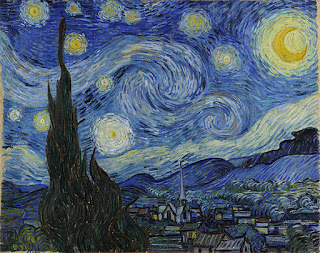 |
| Van Gogh - Starry Night - Google Art Project |
For example, in writing this I allowed myself (as usual) to be distracted by a Facebook post from Ted about the Google Art Project. The immensity, the glory, the power of all that was once available only to a select few – great art from around the world – now in the hands of each of us is unthinkably awe-inspiring. It struck me as madness to have students merely cut and paste coloured tissue to make a tree or weave construction paper placemats when this resource is available with a click. I felt the scale tip heavily toward digital connectedness as a prerequisite for educators.
But the best part of the talk came at the very end when Google Art developer Amit Sood said, “All the amazing stuff does not come from Google or the museums; it’s from the artists.” And that, I realized, is exactly what I haven’t been able to articulate yet, even to myself, what's missing, I think, in our conversations about 21st century education: what art represents, these human ideas that are enduring and connect us all at the deepest level, are what we must focus on to become connected educators. It’s marvelous that we now have the tools to facilitate this connection, tools unimaginable even a few years ago, but the tools are not essential to connect meaningfully and, in fact, can distract us, not by delaying us in our tasks or sending us down different paths as we are thinking, but from our purpose as educators. I'm thinking that before we plug in, we need to refocus on what is enduring rather than what is changing. We get caught up, too often, in chasing what’s new, what’s intriguing, the next trend (and in education, we seem to have created an industry around our latest buzzwords and “best” practices and the attendant profusion of tools and gadgets). Yet as Seth Godin said in a recent blog post (another one of those Facebook updates that I was distracted by – fortuitously, I like to think):
Your audacious life goals are fabulous. We're proud of you for having them. But it's possible that those goals are designed to distract you from the thing that's really frightening you--the shift in daily habits that would mean a re-invention of how you see yourself.
Our failure to transform education, it’s possible, has been in large part due to chasing the next best thing (even when it’s good), rather than doing the hard work of changing our habits and re-inventing education by re-inventing ourselves.
And perhaps to re-invent ourselves in the midst of the relentless pace of our modern world, we need stillness for a little while - in our digital and analogue spaces - to remember again the enduring connections. Look at a work of art. Listen to extraordinary music. Read an exquisite poem. And then keep still. At the count of twelve…
Keeping Quiet
Now we will count to twelve
and we will all keep still.
For once on the face of the earth,
let’s not speak in any language,
let’s stop for a second,
and not move our arms so much.
It would be an exotic moment
without rush, without engines;
we would all be together
in a sudden strangeness.
Fisherman in the cold sea
would not harm whales
and the man gathering salt
would not look at his hurt hands.
Those who prepare green wars,
wars with gas, wars with fire,
victory with no survivors,
would put on clean clothes
and walk about with their brothers
in the shade, doing nothing.
What I want should not be confused
with total inactivity.
Life is what it is about,
I want no truck with death.
If we were not so single-minded
about keeping our lives moving,
and for once could do nothing,
perhaps a huge silence
might interrupt this sadness
of never understanding ourselves
and of threatening ourselves with death.
Perhaps the earth can teach us
as when everything seems dead in winter
and later proves to be alive.
Now I’ll count up to twelve
and you keep quiet and I will go.
Pablo Neruda, Extravagaria, translated by Alastair Reid

Very true--chasing the next thing is much easier than changing habits...
ReplyDelete